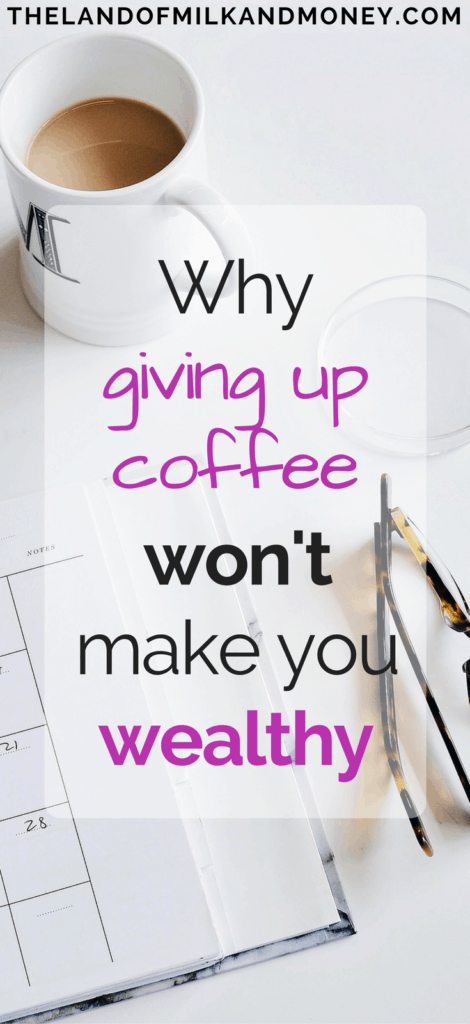We’ve all heard it.
If you stop buying your daily coffee, you’ll save up enough money to be a quadrillionaire. Or something like that.
But what if it’s not true?

I’ve talked before about how limiting your expenditures is one of the, if not the most, important step you can take in the quest to becoming financially free.
At the same time, trying to eliminate every last cent of excess is not the way to become fabulously wealthy. And, arguably more importantly, it’s not the way to live your life.
Some may see those two statements as being contradictory, but just hear me out.
There’s a reason why the tagline of this site is “How to be financially free – while maintaining your latte habit”.
It’s because while it is of the utmost importance to have your finances under control as early as possible, it’s also important to actually have a life. In addition, it’s been shown on multiple occasions that the true key to getting your finances in order is to focus on the big ticket items.
This is not to say that there are no benefits to limiting the amount of lattes you purchase (or lunches you buy instead of making your own or take away dinners that you have instead of cooking at home). Far from it, in fact.
But, as with most things in life, moderation is the key.
Where did this theory come from?
Once upon a time (that is, in 1999), there was once a personal finance guru called David Bach. He believed in a number of things that we here at The Land of Milk and Money also agree with, including that one of the best ways to save is to set aside money for your investments each month before allocating your money to expenses.
However, this can be an issue for people who are living just at or beyond their means and thus may not be at the point that they can even consider investing.
Bach, in his book entitled Smart Women Finish Rich, believed he had the answer to this conundrum: all of these people just need to stop going to Starbucks!
He dubbed it the “Latte Factor”.
The maths behind the Latte Factor is simple: someone in their 20s who spends $5 per day on a latte and a chocolate biscotti (Bach assumed a latte cost $3.50 – ahh, they were glorious times) could, if they gave up their latte habit, save $150 per month or $2,000 per year. By the time that person retires at age 65, if they invested their latte savings at a rate of return of 11% per year, they would have $2,000,000.
Amazing! Give up coffee and become a multi-millionaire! As Bach observed, we all simply need to stop “latte-ing away [our] financial future”!
What could be the problem with that?
Well, a few things, it turns out.

What’s wrong with the Latte Factor?
The maths is wrong
If you multiply $5 per day by 365, you get $1,825. Not $2,000.
So, as observed by Helaine Olen in her book, Pound Foolish: Exposing the Dark Side of the Personal Finance Industry, “Bach ’rounded’ the number up to $2,000 annually, the better to exaggerate the amount of money that latte was, in the long run, costing the person who was drinking it”.
It also sounds much catchier when you’re trying to sell a book.
Our (former) latte connoisseur is a financial genius
As you’ll recall, the final figure of $2,000,000 was based on annual returns of 11%.
Someone averaging returns of 11% over 40 years is absolutely incredible. This lucky hypothetical person apparently managed to dodge recessions while holding just the right type of investments.
However, for those of us who aren’t financial geniuses, it’s far more realistic to assume future average returns of about 8% per year. If it ends up actually being higher: bonus!
We can see why Bach used that number. His book was written in the heady days of the dot-com boom. The stock market was soaring at the time of its release. Most people didn’t predict that the bubble would burst and simply went on their merry way, making mountains of money from stocks in tech.
Unfortunately, anyone who gave up their lattes and started investing upon the release of Bach’s book would have come in at a terrible time. After beginning to invest in 1999 at the height of the market, this person would then have had to deal with the stock market in the years 2001 to 2009, which was a period involving some of the worst returns in the previous 100 years.
While they would be fine now, they may have needed something stronger than just a latte to get through that.
Of course, that specific set of circumstances is not Bach’s fault and he couldn’t have known what was around the corner.
What this seeks to show, however, is that the little phrase on every product disclosure statement is always worth keeping in mind: past performance is not an indicator of future results.
That is, assuming high returns in the future when that assumption is based on the returns that have been seen in the past (or right now) is setting you up for disappointment.
The calculation ignores some key points
In addition to the issue raised above, the $2,000,000 conclusion overlooked a few important considerations.
Namely: inflation and taxes.
A number of people have noticed this before and have run their own calculations, with varying results.
For example, Bad Money Advice concluded that, taking inflation and taxes into account, our latte eschewer would end up with $173,000.
Suze Orman in her book, The Courage to be Rich, found similar numbers, calculating that the Starbucks abandoner would find herself with $165,152.
However, Kimberley Palmer of US News and World Report incorporated the same additional factors and determined that our former caffeine addict would only end up with $50,000.
These numbers aren’t bad – I’d certainly find it difficult to say no to at least $50,000 – but they are not even close to $2,000,000 and certainly will not make you a millionaire.
And they also mean not having any lattes for the rest of your life.
It’s up to you whether or not you think that’s worth it.

There are better ways to reach financial freedom
I’ll get to this point in a moment.
So should we disregard the Latte Factor?
Not entirely.
Firstly, Bach didn’t mean for the Latte Factor to only apply to lattes. It’s intended to serve as a metaphor for all the little luxuries that we buy on a regular basis. Sushi lunches every Thursday with your colleagues. Friday wine nights with your friends at the newest bar in town. Saturday night date nights with your partner at the restaurant down the road.
These are all expenses that may appear to be relatively small but can add up over time.
And cutting back on these can certainly make a difference. As seen above, ending up with $50,000 extra (or slightly more) at retirement is nothing to sniff at, even if it’s not $2,000,000.
But there’s also an argument to be made that there are more effective ways to be financially free.
Focus more on the big wins
As argued at this blog, it can be damn hard to cut back on little expenses over the long term.
This is not to say that you shouldn’t try.
But it’s clear that many people struggle to do this (which is why I am here to help with all sorts of tips on how to spend less and save more!)
At the same time, constantly analysing small purchases is exhausting and not always effective. When we are constantly told that the only way to improve our financial position is to cut back on everything, it can easily feel hopeless.
In addition, when people inevitably fail to do this, they may revert back to financially destructive behaviour as a way to manage their guilt, such as buying things to feel better. While this is obviously counter-intuitive, we all know someone like this.
It is therefore much easier to work at advancing your finances through focussing on the big wins.
What does this entail?
This can be done in a variety of ways.
Set up your bank account so that it automatically assigns a portion of your salary each month to your investments before you start using your money for your various expenses.
If you have a credit card, make sure you only use it up to an amount that you can pay off in full at the end of each month. Ensure that your account is set up so as to automate that payment, to avoid accidentally missing the repayment date and having to pay not only interest, but also late fees.
Call your bank or other lending institution of choice and negotiate a better deal. Politely threaten to move to a competitor (conveniently having information available on the better deal that the competitor offers) if your bank won’t reduce your interest rate or waive your fees to match or beat the other deal.
Take the opportunity of your annual review at work to negotiate a higher salary using solid facts about the salaries offered by similar employers. It doesn’t hurt if you have a good review to rely on as well.
About one month before an insurance policy is up for renewal, shop around for better options. You could even try the negotiation tactic mentioned above. You should also look into the details of your policy and really consider if the amount of coverage that you have is necessary or if you could scale back the coverage and, consequently, the insurance premium.
Get rid of your gym membership. Scrap your cable TV subscription.
Start investing today and take advantage of the magic of compound interest.
All of these strategies can save you thousands of dollars each year, if not more. Far, far more than the $1,875 saved by swearing off lattes.
They also take much less effort and stress. Instead of having to constantly second guess yourself on whether or not you should meet your friends for an after work drink, you can devote a few hours total per year to putting these into effect.
Less stress, less time, more money.
Now that’s a big win.
So I can just maintain my latte habit as is, right?
Well, maybe. It depends.
Do you have any debt?
If you have any debt at all, you should be doing absolutely everything you can to get rid of it.
This should include the big wins outlined above but also includes eliminating other discretionary expenses – that is, the things you “want” rather than those you “need”.
This may, I’m sorry to say, include your lattes.
Debt is the greatest financial burden we will ever face and is the largest obstacle to your financial freedom. In particular, if you are spending more than you earn and thus going even further into debt, you are putting yourself in a dark spiral that will become increasingly harder to escape from.
It becomes a question of what you value more: your daily lattes (or weekly sushi lunch/wine meeting/dinner date) or a life free of financial shackles.
I like caffeine as much as the next person but I know which one of those I prefer.
Do you have savings?
Assuming that you are meeting your savings goals each month – hopefully by paying yourself before paying everyone else – then you may have some more latte leeway.
However, consider the figures discussed earlier in this article.
$50,000 (or $165,152 or $173,000) is not an insignificant portion of the amount that you will need to be financially free.
As such, it is likely in your best interests to cut back a bit.
(Also, if your daily habit is something a bit more health-destructive than a coffee – say, for example, smoking – then it is definitely in your best interests to cut back or eliminate it completely)
This is not necessarily to say that you should give up your coffee habit completely.
Moderation is the key
Instead of buying a coffee on the way to work every day, just rely on the machine at work.
If there isn’t one, you could buy your own Nespresso machine. At the time of writing, that machine is equivalent to 43 days of $5 lattes or six weeks of your latte habit.
You would, of course, have to buy capsules for it. But 50 capsules – or just over seven weeks of daily lattes – have a price equivalent to seven days of $5 lattes. Over one year, assuming that you are having one latte every day, that would equate to $255. Far better than $1,825.
An even more financially responsible way to go is the sacrilege that I commit: train yourself to drink instant coffee. Nescafe Gold is really good, I promise!
Or, I mean, just don’t drink coffee. But you’re on your own with that.
At some point, however, you will have to recognise that your latte (or sushi or wine) should be a treat rather than a habit. For many of us, it becomes a habit and starts to loses some of its shine.
Restricting our expenses to only those things that we strictly need is not the way to live your life (unless you are in debt, in which case these short term sacrifices to pay off your debt have an immense long term payoff).
For example, if you changed your daily latte to a daily Nespresso/instant coffee and instead met your friends for a “real” latte on a Saturday morning (maybe even with some avocado toast!), the latte itself will be more enjoyable and you get the added social boost. Better than sucking it down at your desk.
That is, you’d get to enjoy it as the treat that it is.

At the same time, to paraphrase this very blog: you’d be working more towards being financially free while maintaining your latte habit.
Lifehacker put it well:
“The trick is figuring out which of those little thing really does brighten your life – and which of those things don’t. What you’ll find is that when you really dig into this question, you begin to find that surprisingly few things really make you significantly happy (beyond the initial burst of pleasure at acquiring something). An awful lot of things we buy are part of a routine or done to make others happy or done because we’ve believed that it’ll make us happy when it really doesn’t.”
So if you truly believe that the occasional latte (or lunch date or dinner date or drinks date) makes you happy and your budget shows that this won’t affect your savings goals because of all the other strategies that you have put into place for your big ticket expenses, then you may be good to go.
Conclusion
Jeff Lundy, as cited by Olen, made the following observation: “Spending $2 for a latte may, over the long-term, add up. But it is not the direct cause [of one’s financial struggles]. It has to be in combination with high medical expenses or losing your job or something like that.”
Let’s look beyond the fact that I’d give my left arm for a cafe that sold lattes for $2 these days.
He’s suggesting that it’s the big expenses – as well as the big savings – that can truly affect your financial situation. Not (necessarily) your latte habit.
Cutting back on your smaller “wants” can certainly help over the long-term and is absolutely something that you should focus on doing.
And if you can reduce both your larger expenditures and the smaller day-to-day ones, then great! You’re well on your way to being financially free.
But if some of those “wants” are truly improving your happiness – and, in turn, your health and well being – and you can make it work without (significantly) affecting your financial future, then perhaps they aren’t so bad after all.
In conclusion:
Rule 1: Get rid of all your debt.
Rule 2: Make sure you meet your savings goals. One way to do this is to focus on the big wins.
Rule 3: If you want to spend money on “wants”, make sure you’re only spending money on those things that make you truly happy and only do it within your financial means. And don’t break rules 1 and 2 while doing so.
So…anyone free for a coffee?
Let me know in the comments what you’re aiming to make room for in your budget that makes you truly happy – and what you’re working at cutting back on!


